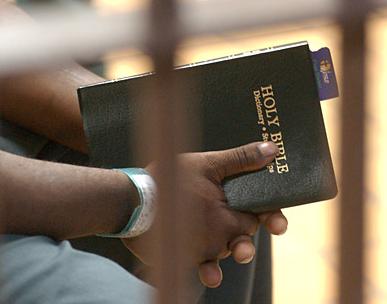Survey: Religion in US Prisons
By Contributor | Mar 23, 2012

From the perspective of the nation’s professional prison chaplains, America’s state penitentiaries are a bustle of religious activity. More than seven-in-ten (73%) state prison chaplains say that efforts by inmates to proselytize or convert other inmates are either very common (31%) or somewhat common (43%). About three-quarters of the chaplains say that a lot (26%) or some (51%) religious switching occurs among inmates in the prisons where they work. Many chaplains report growth from religious switching in the numbers of Muslims and Protestant Christians, in particular.
Overwhelmingly, state prison chaplains consider religious counseling and other religion-based programming an important aspect of rehabilitating prisoners. Nearly three-quarters of the chaplains (73%), for example, say they consider access to religion-related programs in prison to be “absolutely critical” to successful rehabilitation of inmates. And 78% say they consider support from religious groups after inmates are released from prison to be absolutely critical to inmates’ successful rehabilitation and re-entry into society. Among chaplains working in prisons that have religion-related rehabilitation or re-entry programs, more than half (57%) say the quality of such programs has improved over the last three years and six-in-ten (61%) say participation in such programs has gone up.
At the same time, a sizable minority of chaplains say that religious extremism is either very common (12%) or somewhat common (29%) among inmates. Religious extremism is reported by the chaplains as especially common among Muslim inmates (including followers of the Nation of Islam and the Moorish Science Temple of America) and, to a substantial but lesser degree, among followers of pagan or earth-based religions such as Odinism and various forms of Wicca. (See Glossary.) An overwhelming majority of chaplains, however, report that religious extremism seldom poses a threat to the security of the facility in which they work, with only 4% of chaplains saying religious extremism among inmates “almost always” poses a threat to prison security and an additional 19% saying it “sometimes” poses a threat.
These are among the key findings of a survey of prison chaplains in all 50 states by the Pew Research Center’s Forum on Religion & Public Life. The survey was conducted from Sept. 21 to Dec. 23, 2011, using Web and paper questionnaires. The Pew Forum attempted to contact all 1,474 professional chaplains working in state prisons across the country, and 730 chaplains returned completed questionnaires, a response rate of nearly 50%.
Little information is publicly available about the religious lives of the approximately 1.6 million inmates in the U.S. prison system, the vast majority of whom (87%) are under the jurisdiction of state correctional authorities.8 The U.S. Bureau of Justice Statistics routinely reports on several characteristics of the U.S. prison population, such as age, gender and racial/ethnic composition, but it does not usually report on the religious affiliation of inmates, and independent surveys of inmates rarely are permitted.9 Thus, the Pew Forum survey offers a rare window into the religious lives of inmates through the lens of prison chaplains.
In assessing that lens, it may be helpful to know some characteristics of the chaplains who responded to the survey. They are predominately male (85%), middle-aged (57 years old, on average), white (70%), Christian (85%, including a 44% plurality who are evangelical Protestants) and highly educated (62% with graduate degrees). They describe themselves as conservative on both social issues (53%) and political issues (55%). Most report having a lot of direct contact with inmates: Fully 90% say they have one-on-one contact with at least a quarter of all the inmates in the facility where they work, and two-thirds (66%) say that “personally leading worship services, religious instruction sessions or spiritual counseling sessions” is among the top three activities on which they spend the most time. About half have been on the job for more than a decade, and most report high job satisfaction.
Read more: http://www.pewforum.org/Social-Welfare/prison-chaplains-exec.aspx















